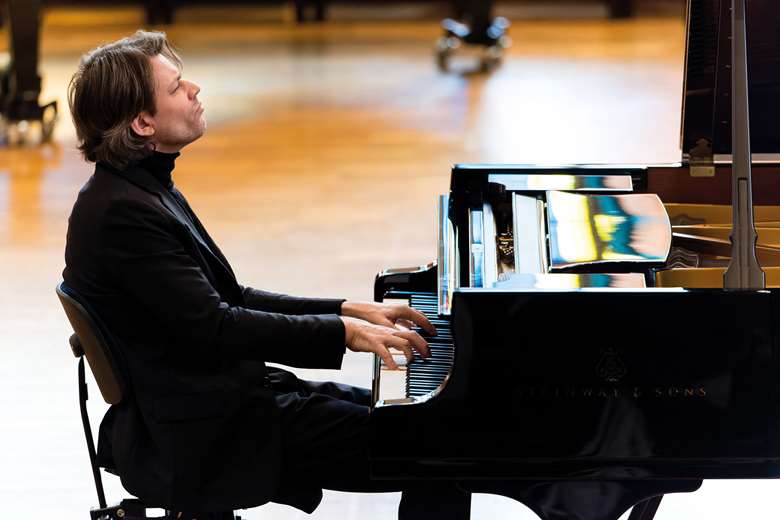Live Review: Le Piano Symphonique (Lucerne)
Simon Mundy
Friday, March 8, 2024
In a very lively acoustic the Steinway piano was too brittle for this music but Fray coaxed it into subtlety between the moments of frenzy

When the venerable but somewhat complacent Lucerne Festival scrapped its winter piano programme five years ago, it left a vacuum. The board of the city’s modernist concert hall, KKL, which dominates the lakeside, felt that the tradition of great pianists who lived and holidayed nearby over the past two centuries deserved a dedicated event. They therefore put the idea of a piano festival out to tender and the resident symphony orchestra took up the challenge.
The result, now in its fourth year, has been Le Piano Symphonique, held in the third week of January (something of a lull in Europe’s festival life) and involving the orchestra but also having the programming freedom to mix and match within lunchtime and evening concerts, to involve the occasional singer, to pair great and emerging pianists, and generally to surprise audiences. The fullish houses suggest the concept is working well.
The guiding hands of the festival are its Associate Artist Martha Argerich, more often on stage in chamber music than concertos, the Lucerne SO’s Artistic Director Numa Bischof Ullmann and Principal Conductor Michael Sanderling. Between them they have devised a formula that nicely undermines expectations. The evenings are divided into two ‘acts’, the first mostly holding concertos, the second chamber music. The audience certainly gets its money’s worth – the combined concerts last a good three hours but, as Ullmann says, this allows a far broader range of programmes. These are then supplemented by lunchtime events in the nearby Lukaskirche, featuring several of the same pianists as the evenings. This way the pianists effectively have residencies at the festival, sometimes as soloists, at others playing together, and often playing just a single work. They become part of an engaged festival family.
This year I attended the first three days of the festival, which opened with a cancellation. Mikhail Pletnev replaced Maria João Pires, beginning with Schubert’s Sonata in A minor, D537, and completing his solo half with the Op 28 Preludes of Chopin. This was quite simply a poetry reading, every note considered and allowed to take hold, his body rigorously still. The transitions were masterly, to the point where they became almost more full of import than the thematic material, and when he needed to break out of contemplation and give a more furious passage full rein, the contrast was all the more startling.
For the second act, Pletnev was joined by Martha Argerich for Mozart’s Andante with Five Variations, K501, and Schubert’s Fantasy in F minor, D940. This was like Nannerl and Wolfgang 40 years on – no longer the tyros of old but a couple of stars reminiscing together. The ebb and flow was beguiling, though almost too restrained by the end. After all the profundity came the encore. ‘Bach!’, Pletnev barked at us and launched the opening notes of the D minor Toccata, BWV545 (minus the Fugue), but that was just about all the Bach there was. Instead these two consummate musicians improvised together for 10 minutes, as if they had been rehearsing for weeks.
The first of the lunchtime concerts in the stark rectangle of the Lukaskirche offered more Schubert, in the hands of David Fray. The most successful work in his set was the Four Impromptus, D899. In a very lively acoustic the Steinway piano was too brittle for this music but Fray coaxed it into subtlety between the moments of frenzy. Unlike many of his generation he does not bang the keys, and the pathos in these late pieces came through.
The quality of Fray’s playing was demonstrated by direct comparison with the next pianist on the main stage, this time with the orchestra: Yoav Levanon. He seems to be modelling himself on Liszt, from hairstyle to showmanship. His fingers thrash through the notes but almost without fail he misses the musical point. Liszt is a mannerist composer, in the way that El Greco is a mannerist painter; lines are twisted and elongated to emphasise complexity. But the direction and impact of the music must still be clear. With Levanon the virtuosity leads nowhere, which does nothing to enhance the stature of Liszt’s First Piano Concerto.
Immediately afterwards we were treated to an exhibition of how a Romantic concerto really should sound, when Elisabeth Leonskaja played the Grieg. Her ability to combine percussive precision with veiled colours – driving forwards the outer movements while allowing the Adagio to luxuriate – was perfectly judged.
For the second act of the following night’s concert Leonskaja was back to play Schumann’s Études symphoniques. It is not the easiest piece to make sound like a coherent whole, but she shaped it as if it was a cycle in different moods but with one intent. David Fray then joined her on the same keyboard for Schubert’s Allegro in A minor, D947, with Fray taking the primo part. They took it at a relentless canter, smiling with each other in a way that reminded us that this was not destined for the concert hall but for two friends to play at home. Their obvious pleasure was ours.
Finally, another highlight took place in a lunchtime concert at the Lukaskirche. ‘Made in Switzerland’ did what it said on the chocolate box, with Oliver Schnyder giving an engaging review of the Swiss book of Liszt’s Années de pèlerinage, finishing with Geneva’s rather intrusive bells.
Performances
KKL Konzertsaal
Mikhail Pletnev & Martha Argerich 16 January
Yoav Levanon, Elisabeth Leonskaja 17 January
Elisabeth Leonskaja, David Fray 18 January
Lukaskirche
David Fray 17 January
Oliver Schnyder 18 January
This article originally appeared in the Spring 2024 issue of International Piano. Never miss an issue – subscribe today











